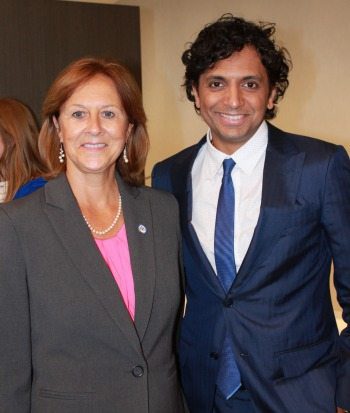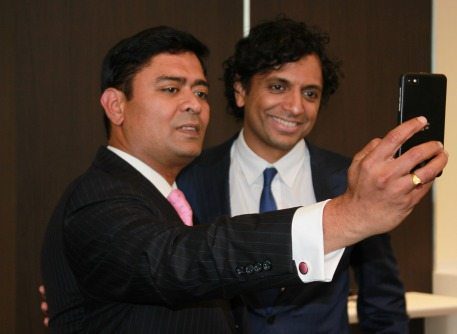
“That politicians aren’t leading with this is astonishing,” M. Night Shyamalan tells us at an event aimed at opening up the conversation on U.S. education reform.
He commands a room of about 60 who have come to hear him speak about his book I Got Schooled: The Unlikely Story of How a Moonlighting Movie Maker Learned the Five Keys to Closing America’s Education Gap and his Philadelphia-based nonprofit, the MNS Foundation.
The 43-year old directed and produced The Sixth Sense, Unbreakable, Signs and The Village, among other titles, before going the philanthropic route and co-founding the MNS Foundation with his wife Dr. Bhavna Shyamalan in 2002.
The book, which didn’t come until 2013, is the reason for last week’s NCI, Inc.-sponsored event — “A Conversation with M. Night Shyamalan,” moderated by former Emmy award winning NBC and ABC News Producer A’Lelia Bundles, the president and chair of the board of the Foundation for the National Archives.
Dressed in a royal blue suit, the 43-year old adjusts his skinny tie, and keeps going.
“You think writing checks is the answer at first. But what everyone needs is not money but human capital.”
He outlines the five keys to closing the education achievement gap created by barriers such as poverty and inequality across geographic communities — the majority of which he says manifests itself during the summer months when students fall victim to the “summer slide.”
And while students tend generally to forget some of what they learned during the school year during the summer vacation period, Shyamalan says that students from impoverished communities come back to school at the end of vacation having lost 3 months of learning, putting them at a disadvantage when compared to their more affluent counterparts.
“Eighteen percent of the country’s schools are those inner-city schools that we’ve been neglecting,” Shyamalan says noting that “two-thirds of the education gap that exists between communities arises during the summer months.”
As outlined in the book, Shyamalan and the MNS Foundation have implemented a program that, if adhered to, will close the education gap in the neglected schools. His five guidelines are: schools should be permitted to dismiss low-performing teachers, principals should focus the bulk of their time on mentoring and teaching their school’s teachers, teaching should be predominantly prescriptive — basing itself on evidence, students should spend more time in school, and schools can boost graduation rates by minimizing their size.
“There’s no correlation between a teacher’s higher-ed degree and the students’ achievement,” Shyamalan says. Rather, “in these schools, best practices flourish.”
Patty Reed, a Providence District Representative for Fairfax County Public Schools, said she enjoyed the evening.
“Shyamalan’s passion and commitment to closing the achievement gap sparked a vibrant question and answer session with like-minded community and business leaders,” Reed said. “As a School Board member, I believe we can accomplish much by collaborating on such challenging issues.”
RJ Narang, the president and CEO of Renegade Technology Systems, Inc., said the event highlighted the importance of reforming education.
“I personally came away from the discussion with M. Night better informed and inspired to do more on my part in furthering this agenda,” Narang said. “This is a topic which affects us all, and specifically could be the silver bullet in assisting underprivileged communities combat problems such as crime, poverty, and unemployment.”
Shyamalan spoke on the same topic at a luncheon hosted at the National Press Club last week. See that here.







